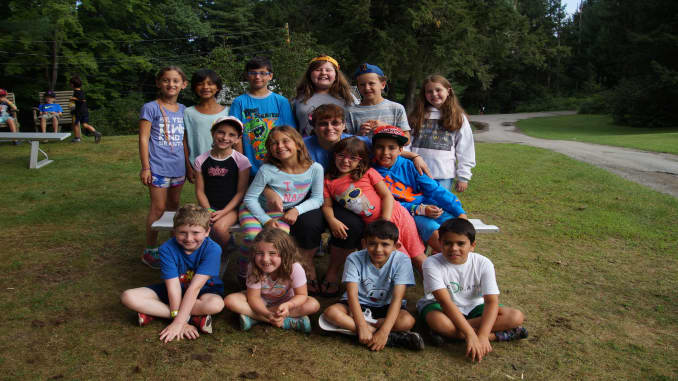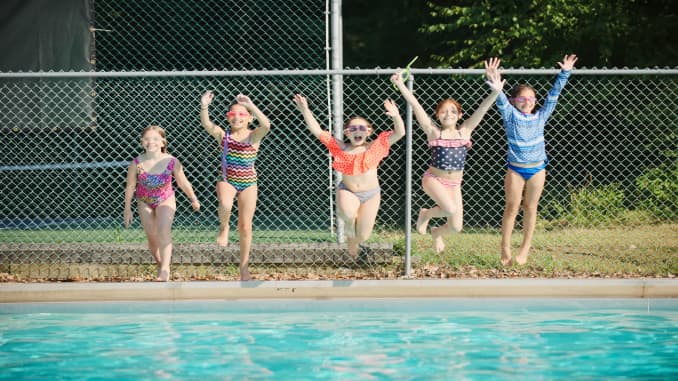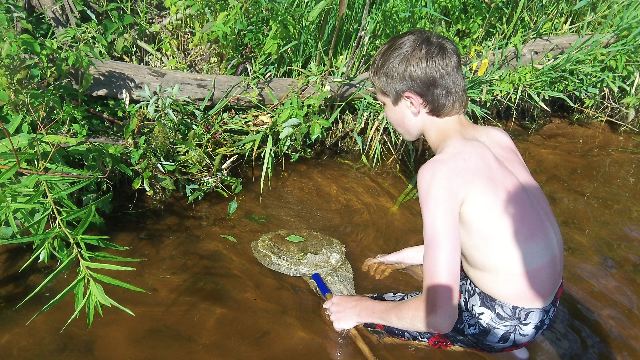Overnight Summer Camp is OPEN in 2020 with COVID-19 precautions in place.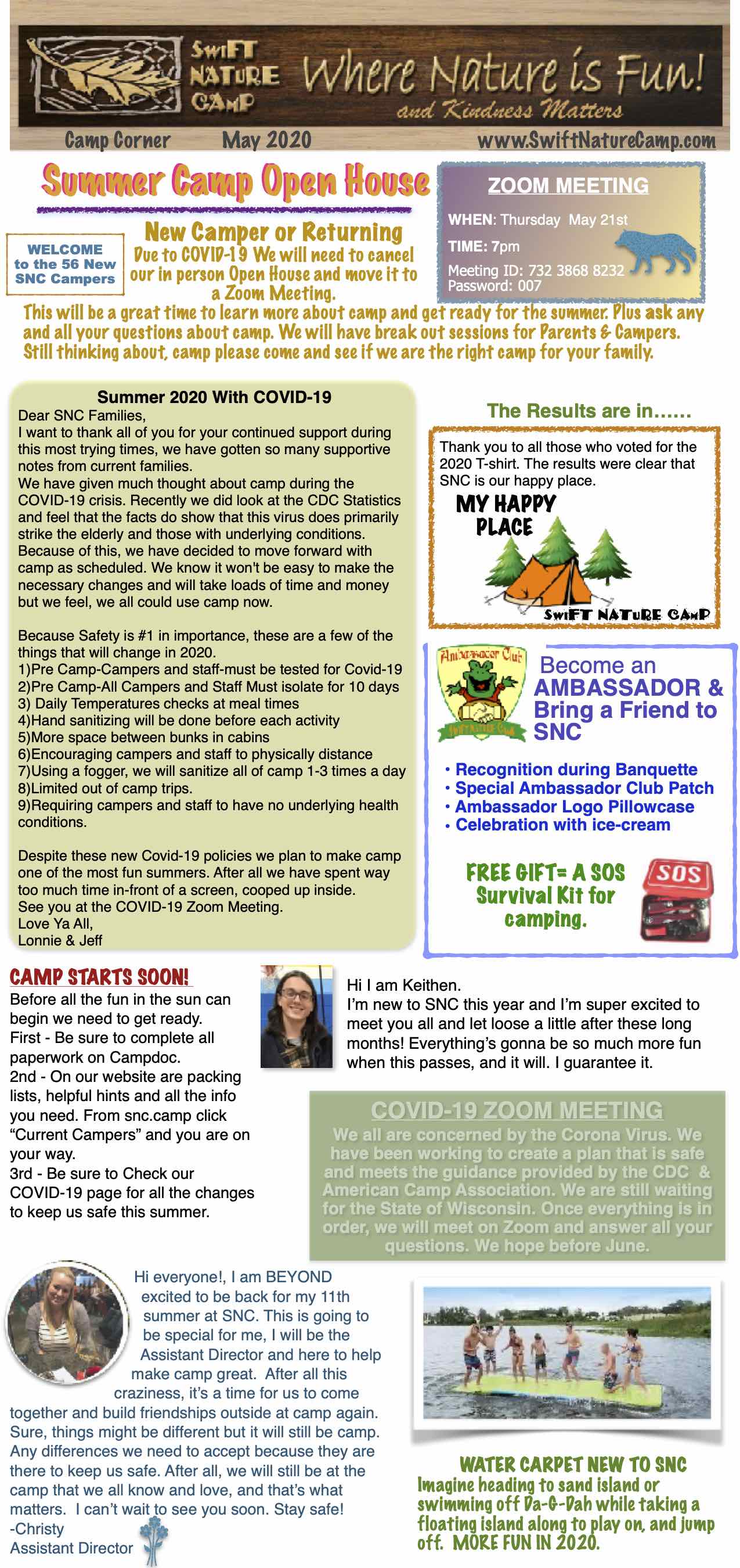
‘Sleepaway camps have the potential to create a protective bubble,’
says former FDA Commissioner Scott Gottlieb
Summer Camp 2020 Will Happen!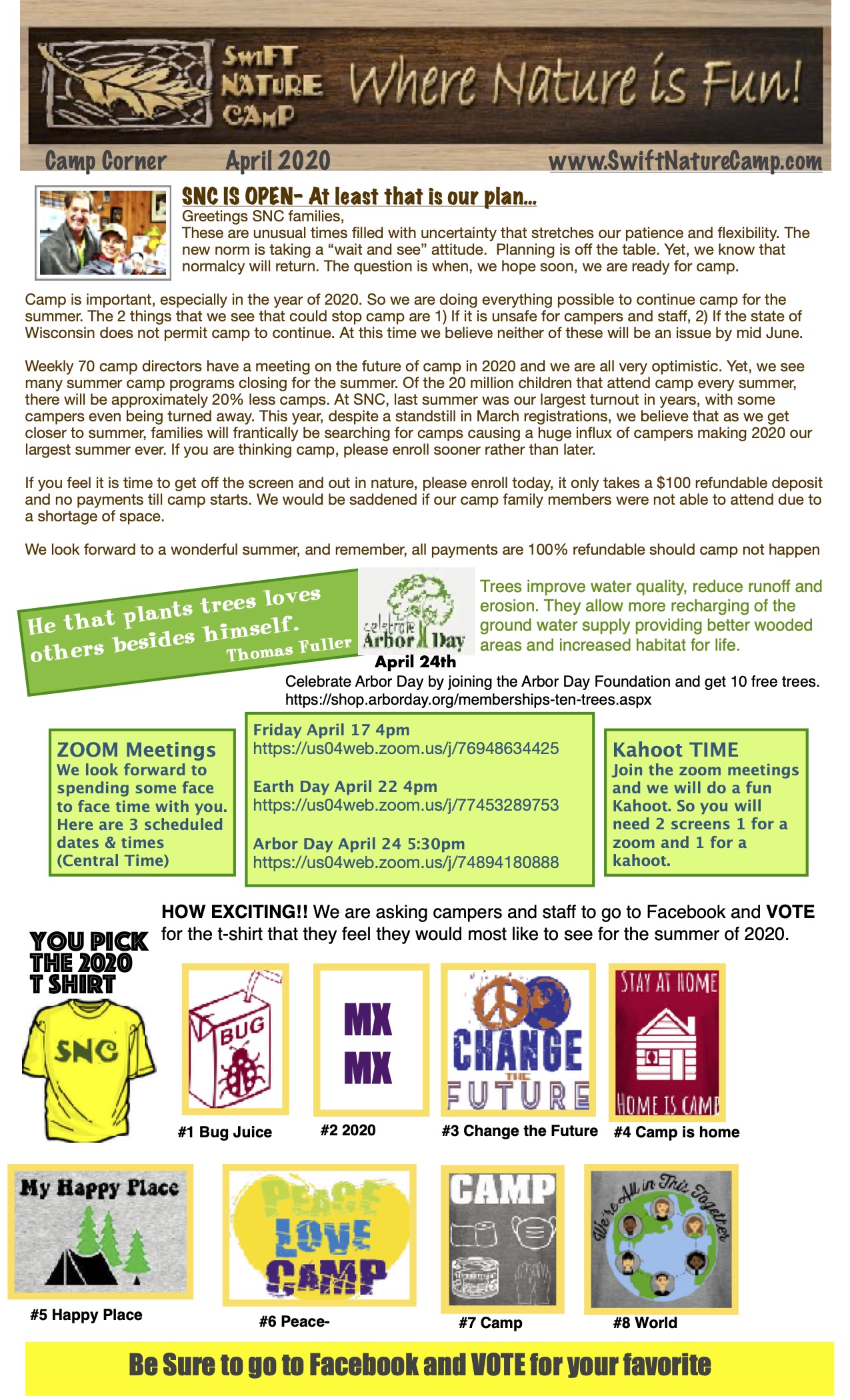
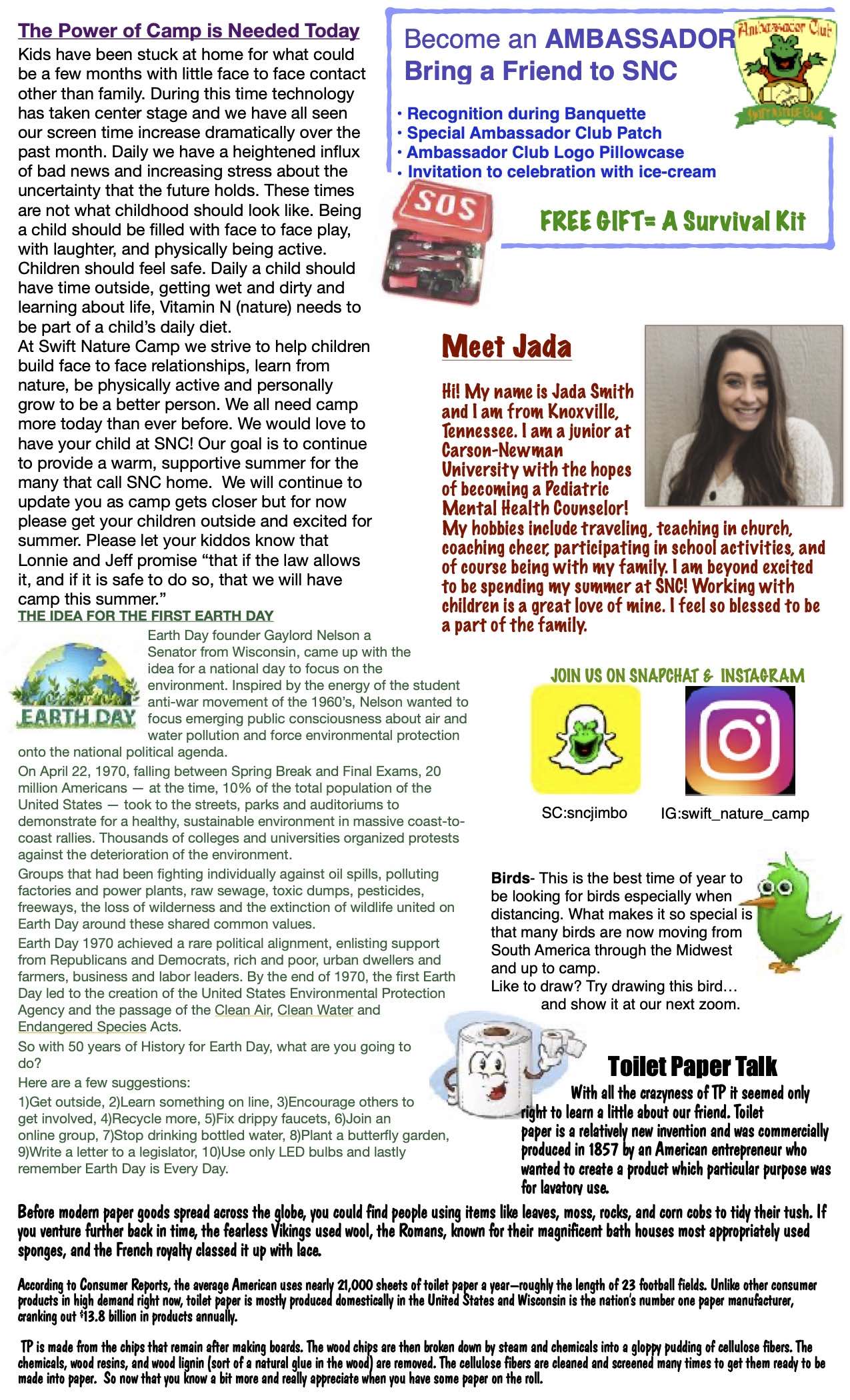
Time: Apr 17, 2020 04:00 PM Central Time (US and Canada)
Join Zoom Meeting
https://us04web.zoom.us/j/76948634425
Time: Apr 22, 2020 04:00 PM Central Time (US and Canada)
Join Zoom Meeting
https://us04web.zoom.us/j/77453289753
Time: Apr 24, 2020 05:30 PM Central Time (US and Canada)
Join Zoom Meeting
https://us04web.zoom.us/j/74894180888
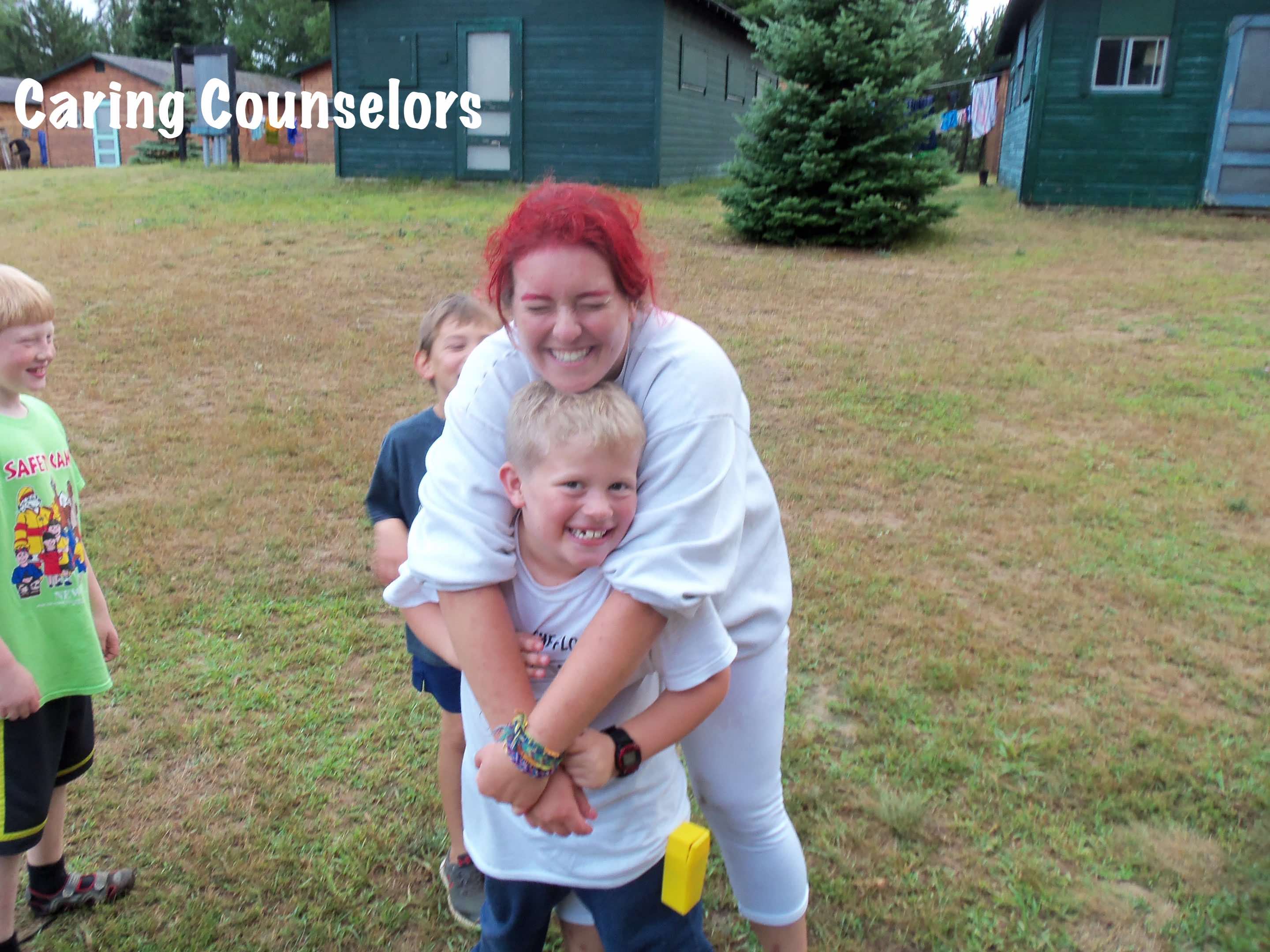
Top Five Reasons to Pursue a Rewarding Camp Counselor Job in Illinois
Experience the joy of shaping young minds as a camp counselor at an overnight summer camp in Illinois! Join us on a transformative journey where each day brings the chance to positively impact children's lives. Engage in customized activities that spark curiosity and wonder, becoming the inspirational figure who shapes a child's future through laughter and growth. At our Illinois camp, you'll find fulfillment in creating memorable experiences for campers, fostering a sense of community, and embracing the beauty of the great outdoors. Join our team and discover the rewarding adventure of guiding and inspiring the next generation with a summer camp job in Illinois.
Acquire Versatile Life SkillsBeyond the surface of camp activities lies a wealth of invaluable skills applicable to any career path. Whether you're instructing archery or leading nature hikes, you'll refine patience, enhance public speaking abilities, and master the art of effective communication. The lessons learned at camp extend far beyond its grounds, empowering you for life's diverse challenges.
Forge Strong Leadership Abilities
Emerge as a confident leader through comprehensive training uniquely offered by camp counselor positions. Beyond managing children, you'll cultivate leadership qualities grounded in guidance rather than authority. Camp not only nurtures individual growth in campers but also hones your leadership potential, shaping you into a capable leader in any setting.
Immerse Yourself in Nature
Escape to the picturesque landscapes of Illinois and immerse yourself in the wonders of the great outdoors. Spend your summer surrounded by the scenic beauty of nature, from serene lakes to starlit skies, fostering a profound appreciation for the environment and creating lasting memories amidst the tranquil Northwoods.
Experience Unforgettable Growth
Director Since 1996
Coronavirus Disease Update
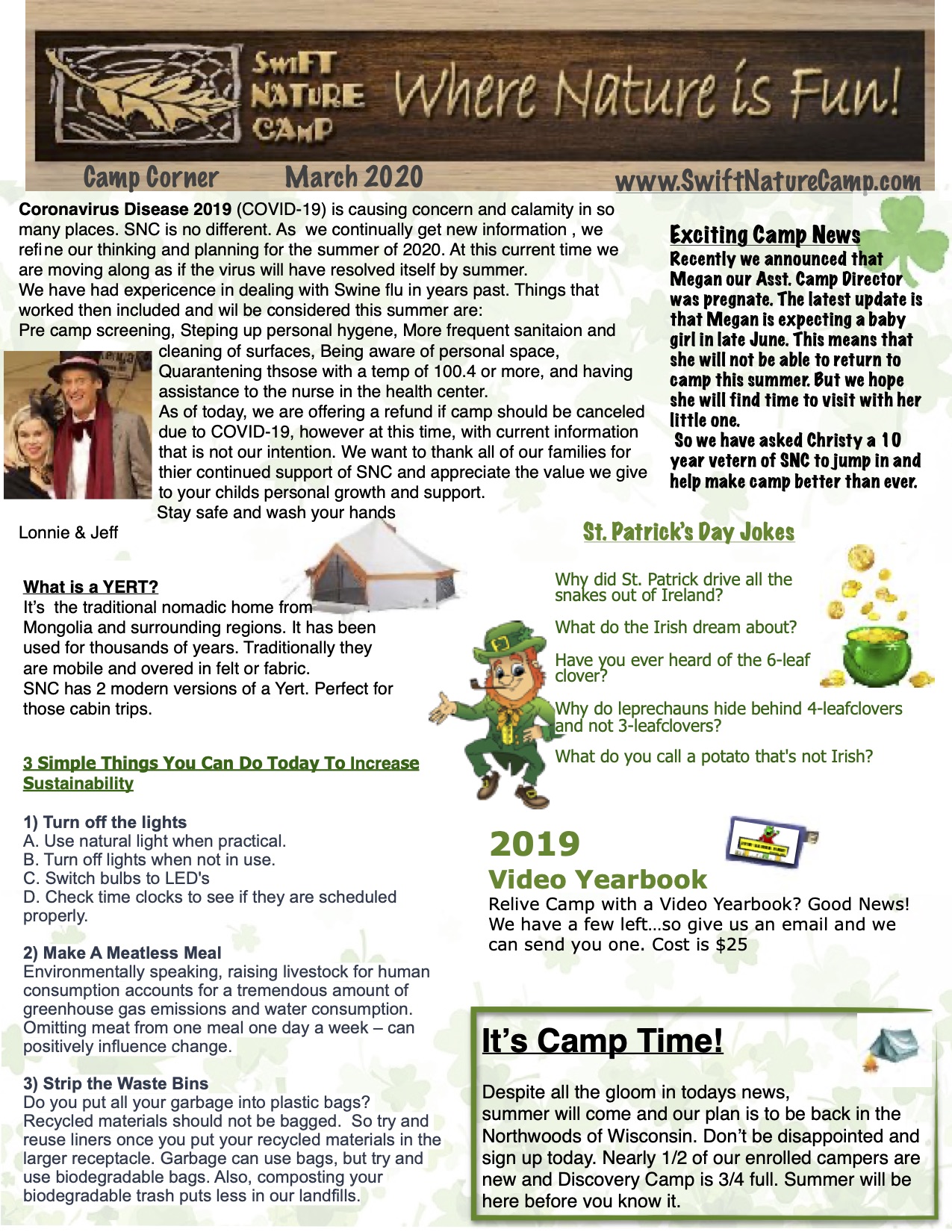

The Latest Covid News at Camp

2021 COVID-19 SUMMER CAMP PLAN
QUARANTINE CONTRACT- please download and complete
Swift families -
As we all anxiously await the beginning of camp we all need to realize that SNC will be different in 2021. Yes, we ran camp successfully in 2020 with no COVID and plan on doing it again in 2021. Yet, we can not tell you definitively what our COVID-19 plan will be for the summer ahead. So as you read below, understand that we will use the latest science to help us protect our campers in 2021 and that are plans will continuously be changing up till camp time.
2020 RESULTS
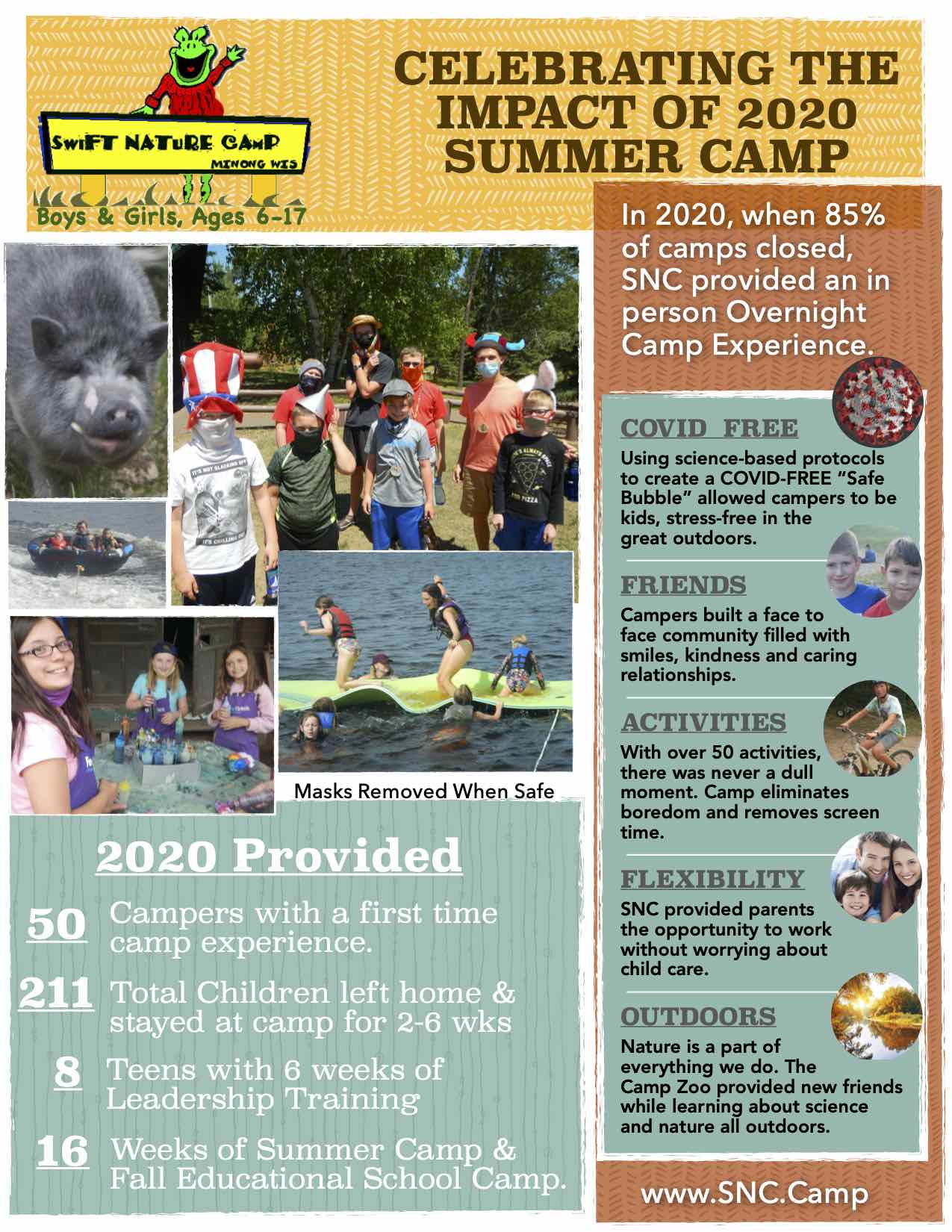
THIS IS WHAT WE DID IN 2020
Our goal is to create a protective bubble around camp to protect our children. To accomplish this, we will need to be sure that those coming into camp are COVID free, while keeping the rest of society out of camp. Our main focus is to take care of everyone within that bubble while reducing the impact from the outside COVID world. The strength with which we enforce the plan may seem unfair or difficult but we believe it is what strengthens the protection of our bubble. So apologies up front if you find our plan difficult or inconvenient. It was not our goal to be burdensome on your family, just to keep all safe while providing a summer camp experience.
The basic parts of our plan:
We are going to do everything possible to create a self-contained bubble to protect our camp community.
We will monitor all campers and staff upon arrival and throughout the camp session.
We will ask families to self-isolate their campers for a 12-14 day period before arriving to camp. We will begin each session with a 3 day cabin quarantine, followed by a 4 day modified quarantine.
Sanitizing and cleaning will be at the forefront, and there will be lots of hand washing and hand sanitizing.
There will be times where campers and staff will be asked to wear masks.
Our live - in nurse and the doctor in town will work with us to support any medical needs that campers have.
Some parts of camp won't be fun, like wearing a mask. But we will be next to a shimmering lake, in the woods, among friends and have a ton of activities to participate in.
Lastly, COVID may arrive at camp, but working with our nurse, local doctor and hospitals we believe we can isolate and get campers tested, plus maybe a vaccine maybe available.
Preventative measures :
We are asking all families to self-isolate their campers for 12 days before their arrival at camp. This means that campers should not be leaving the house or playing with friends. If other individuals in the house are working outside the home, we ask that they wear masks and/or adhere to social distancing guidelines within the house. We will provide you with a form (available on (Campdoc) & here to record your child's temperature and any possible symptoms during this time. Our counselors have already arrived at camp and will be isolated here for over 2 weeks before campers arrive. Our counselors have agreed not to leave camp for the entire 10 weeks that they will be working this summer.
Additional things we are doing to stop COVID:
We will have additional PPE for any staff performing healthcare duties and will have additional hand sanitizer, soap, and cleaning supplies to use as necessary.
Cabins will be sterilized with UV light during meals when all campers are out of the cabin.
We will be keeping windows and doors (with screens) open at all times to promote fresh air circulation through buildings.
Travel by SNC Motor Coach
For campers that are taking the bus, their luggage aside from a carry on with a packed lunch should be placed in the trunk. We will ask that parents do not get out of the car. Campers will be expected to wear a face covering, and camp staff will be wearing a face covering as well. Camp staff members will check the camper's temperature and ask about any symptoms. Assuming things are clear, the camper will then get out with their carry on to board the bus. Camp staff members will retrieve luggage from the trunk and load it onto the bus. There will be assigned seating on the bus and campers will be asked to wear a face covering aside from when they are eating, and we will ask campers to bring a packed lunch so that there will be no need to stop for food. Continous movies will be showing to help pass the time.
Driving TO Camp
If you are driving your camper to camp, please place your luggage in the trunk. We will ask that parents do not get out of the car and that campers are wearing a face covering. A staff member will screen your child while they are in the vehicle and then they will be able to get out and staff will help them to unload their luggage from the vehicle. We would ask that while you travel to camp, you minimize stops as much as possible and wear face coverings and adhere to social distancing guidelines if you need to be in public. We recommend packing meals and snacks and only stopping as necessary for restroom visits and gas. Please wash your hands and use hand sanitizer frequently.
Driving FROM Camp
If you are driving to get your camper we are allowing you to get out of your car and walk around camp. Please do not go into any buildings and keep 6 ft from others while at camp and please bring a mask.
Flying to Camp
If your camper will be flying to camp, please contact us so that we can discuss the safest way to fly and how to keep your child safe while protecting our safe bubble.
Quarantining at Camp
When camp starts, all campers and staff will be wearing face coverings. Progressive quarantining is our plan. We will keep campers in their small cabin groups for the first parts of camp and gradually widen their circle of contact to include other cabins at camp. These quarantines will be fun and filled with activities, so it’s more than just sitting in the basement staring at a screen.
For the first 3 days of camp, campers and staff will wear face coverings whenever they are inside and not eating or sleeping, or are outside and cannot physically distance. Campers will be with their cabin for all activities for these first 3 days, with the exception of a few outdoor activities where everyone can be physically distanced. We will be screening everyone's temperature with a touchless thermometer before each meal. Cabin bathroom visits will be scheduled to minimize interaction between groups.
For days 4-7 of camp, campers will wear masks when they are inside with other cabin groups or are outside and cannot physically distance from other camper groups. When campers are only with members of their cabin, face coverings will not be required. We will screen temperatures once a day and group bathroom visits will continue to be scheduled.
At day 8 till the end of the session face covering and other requirements may be lifted or extended based on the guidance of our live- in nurse and the results from the first 7 days.
Staying Between Session:
We will not be allowing any outside visitors on camp between sessions. Campers that are staying for more than one session will need to remain on camp between sessions, because their first session at camp will essentially qualify as their 12 day before camp quarantine. Between session care is available at a charge of $150.
Dining Hall:
We know that the indoors create a time of risk. Here are some things we are doing in our Dining hall. First, we will wash our hands and wait to be called in to the Dining hall by cabin group. Campers will be asked to wear masks when they gather before meals while temperature checks are happening. Grace and other songs will be sung outside before entering the Dining hall. Campers and staff will remove their masks after all food is served. Tables will be separated from other tables by at least a 6 foot difference. The dinning hall will be sanitized with a fogger once a day and cleaned before and after each meal. After leaving, all campers’ hands will be sanitized. Windows will remain open promoting air flow.
Bathrooms:
Bathroom trips will be scheduled by cabin group for the first days to limit group mixing. Our bathrooms are large enough that campers can maintain distances during individual bathroom trips.
Activities:
All campers will wash their hands and/or use hand sanitizer before and after any activity. For the first 7 days, instructor staff will wear face coverings when teaching indoors or during outdoor activities that require close physical contact. (We can't realistically have someone teach a swimming lesson with a mask, but an archery instructor should wear one if they are close to campers to distribute equipment or help them to adjust their form.
What happens if we suspect COVID:
If a camper or staff member shows symptoms of COVID-19 at camp, they will be quickly isolated, and we will arrange for them to be tested for COVID-19. If they test positive, we will continue to isolate them from the rest of camp, and will ask you to arrange for their travel home within 24 hours. In cases where that is not possible, we will work with you to find a solution. If a camper tests positive, we will have all individuals in the cabin tested as well. If a camper needs further care for severe symptoms, we would take them to the hospital in Spooner or Hayward, and for more serious issues, transport to a hospital in Duluth, MN can be arranged.
What we need from you:
Success depends on you. We need you to believe that what you are doing will have an impact on your child and every other child at camp. So please take the 12 day isolation seriously. All it takes is a parent to fudge his documents and the next thing you know our camp is shut down and every child is sent home. No parent wants that.
Helpful Hints:
Please send your camper with 2-4 cloth face coverings. We recommend buffs for this purpose because they can be worn around the neck as well, making them easy to keep track of. We would not recommend disposable masks. If you choose to send disposable masks with your camper, you should expect them to go through several a day when taking into account hot weather and varied activities. Have them pack an extra pair of warm pajamas or an extra blanket to keep warm on any chilly nights. Make sure to send a sturdy water bottle, we will not be using any water fountains at camp. Your camper may want hand cream or lotion to help with any dryness from extra hand washing.
COVID Waiver:
We will be asking all families to sign a waiver that they understand the risks associated with Covid-19 and that in no way can SNC guarantee a COVID free summer for your child. But we will do our best.
Camper Responsibility:
Please note, we will be taking these policies very seriously, more serious than any other activity at camp. Please review this list with your campers to make sure that they are prepared and emotionally mature enough to handle the changing requirements in camp areas. You know your child best, and we trust you to decide if they can handle the responsibility of helping to keep everyone at camp safe. If after repeated chances your child is unable to follow instructions, keep a mask on or cannot social distance, you may be asked to come and pick up your child with no refund. Practice wearing a comfortable mask (face covering) before hand so your child is used to it.
Last Day to Enroll
because campers will need to isolat we will be closing enrolment 14 days prior to the start of each session. Thank you for your understanding.
If you have questions or want to chat about any of our new COVID-19 mitigation protocols or have any other questions about camp, please contact us. The easiest and most reliable way to contact us is to send us an e-mail. You are also welcome to call at any time (715.466.5666), but we are often out of the office getting things done around camp and you may need to leave a message.
We believe that all campers that returns home from camp should isolate and not go to see older adults for 2 weeks especially those that may have extenuating conditions that do not react well to COVID.
If you are still considering whether to register for camp or not, please know that we will be closing registration at 13 days before each session begins to allow families to quarantine their campers for the requested 12 days.
We are grateful for all of our camp families and are committed to making sure our campers can have a safe and fun summer, and allow them to spend much needed time being active outside.
5/23/2020. COVID-19
Dear Swift Families -
I hope this message finds you healthy and happy! We have arrived at camp with our staff and have already started working with them on how we are going to make this summer fun and safe.
So many activities that our children participate in have been changed or cancelled in the last few months. We want to assure you that while we are making some changes to meet the unique safety concerns posed by Covid-19, we would not choose to run our program if we could not ensure that we will be providing a fun and exciting experience. We've been working with experts to make sure that we can protect the physical health of our campers and staff while providing them with a much needed outdoor summer experience to refresh their mental and emotional health.
We want to meet with you again online on a ZOOM MEETING FRIDAY At 6:30 so that we can answer all of your questions and tell you more about precautions we are taking and some things that will change. We want to assure you and your children that Swift will absolutely still be a fun place to be this summer.
We'd like to give you some examples & information to guide you and and perhaps help you to organize any questions that you might have. Some of the precautions that we are taking will have no or very minimal affects on the camp program. For example, we will be asking you to self-quarantine your camper for 10-12 days before arriving at camp. Our staff are doing an additional quarantine at camp before any campers arrive, and they have commited to spending their entire summer on camp property to make sure that they won't be exposed to other people, allowing them to maintain a "safety bubble" at camp. We'll be using UV light and environmentally friendly disinfectant sprayers to clean supplies, equipment and sanitize living areas several times a day.
We are lucky that our program is based on nature and the outdoors, so most of our activities take place outside. Studies have shown the risk of transmission of the covid-19 virus are extremely low in outdoor environments. A few examples of how things might change camp schedule/activity wise:
We will be treating all of our cabins as "family units", so for the first few days we will maximize the time spent in these small groups. This is only a slight extension of what we would do normally - we've always prioritized time together as a cabin during the first few days at camp so that cabin mates can bond as a group. Instructors at all of our activities will teach in ways that promote distancing. Campers at the nature center can learn about camouflage through games where they hide in the woods using camouflage themselves. Campers can learn about survival skills by spreading out and building shelters or learning how to create a solar still to collect fresh water. Campers at boating may demonstrate their skills by playing a game of follow the leader instead of a game where they boats could be side by side.
Some activities won't really need to change at all from the camper facing side of things. Swimming is considered to be a very low risk activity - we will sterilize equipment like water toys as needed, but our swimming is outside, in a well ventilated environment (the breeze near the lake is great) and on sunny days the natural UV light speed the denaturing of the virus. At an activity like archery, campers are already distanced for safety reasons, and our instructors will be outfitted with hand sanitizer so that campers can cleanse their hands before and after using equipment.
And some things will change in ways that we are really quite excited about - brainstorming ways to promote physical distancing have lead us to come up with ideas that could change camp routines in fun ways. Now we want to be able to pull some of these surprises out of our sleeves while at camp so to maintain our campers excitement levels and give them new and exciting things to write home to you about. But to give you an example, during camp we historically have eaten nearly all our meals together in the dining hall. We'll still be eating there commonly but this year we will be asking campers and staff to wear masks in certain as they enter, exit and while they are waiting to be served. It's likely that we will wear mask for singing grace together in the dining hall. But cabins will also have the chance to have new experiences at meals. Instead of eating lunch in the dining hall for the 10th day in a row, they might get a packed picnic lunch to have with their cabin outside. Campers might decide to have lunch near the bog, where they can watch the turtles that are almost always sunning themselves around lunchtime each day. Another group might decide to head out on a couple of rowboats and have a floating lunch in the middle of the lake. With a lifeguard, a cabin might even choose to set up their lunch on the dock in the swimming area and eat while sitting in the shallow water.
From the administrative side of things, we want you to know all of the things that we are doing to keep everyone at camp safe, and we want to make sure our campers feel safe at camp - we know that many of them have had increased anxiety over the past few months. And that is where the fun comes in - we can keep our campers safe while making sure that they can still be kids. Some of the things at camp won't have to change at all. Some of the things will be slightly different. And some of the things will be new and inspired in exciting ways that we can't wait to share with your children.
Thank you for planning to share your children with us for the summer, we can't wait to meet our new campers and be reunited with our old friends.
Lonnie & Jeff Lorenz
Swift Nature Camp
http://SNC.Camp
715-466-5666
_________________________________________________________________________________
Covid-19 has caused a huge disruption in the world and as we begin a recovery Parents wonder if summer camp is safe. Over 30% of the summer camps have closed for the summer because they felt it was impossible to tame this virus. At Swift Nature Camp we will remain open because we see things differently, we know this virus has devastating effects the elderly and those with conditions. Our goal is to create a "safe bubble" that will keep kids safe. This concept was recently mentioned in a Wall Street Journal article ByAaron E. Carroll
Here is just a part of that article:
Overnight camp is different. It’s both safer and riskier.
As we work on getting our COVID-19 Plan together we know it will include Testing Isolation & Sanitation, Here are a few safety measures SNC will implement:
TESTING
1) Pre Camp-Campers and staff-must be tested for Covid-19
2) Pre Camp-All Campers and Staff Must isolate for 10 days
3) Daily Temperatures checks at meal times
4) Requiring campers and staff to have no underlying health conditions.
SANITATION
5 ) Hand sanitizing will be done before each activity
6) Using a fogger, we will sanitize all of camp 1-3 times a day
7) UVC lights will be used in building during off times to kill virus
ISOLATION
8 ) Encouraging campers and staff to physically distance
9) Limited out of camp trips.
10) More space between bunks in cabins
This is just an overview of some of the things we will be doing this summer to keep our campers safe. If you have questions or would like to chat more please give us a call. Our COVID-19 Plan will be released in early June. Best to all and stay safe.
HERE IA A GREAT ARTICLE
Summer Is Approaching. Bring Camp Back.
_____________________________________________________________________
Our plan is to have Overnight Summer Camp in 2020, here is what we are thinking to keep our campers safe from Coronavirus.
Dear Swift Families,
Like all of you, we are looking forward to being together at Swift this summer. Our weekly Zoom meetings, filled with smiling faces and fun activities only reinforce how much we all want our Northwoods camp community to be open this summer.
*SUMMER 2020* --All the planning in the world cannot tell us what this summer will look like. It seems that this pandemic has taught us all to be a bit more flexible and patient. Thank you to our camp families who have been extremely patient. It is early May and we have only had a few families drop from camp while during the same time we have had more than 10 campers join, despite the unclear future. Like many of you, we have been following all the projections, updates, and spending too many hours watching news conferences.
Swift Nature Camp is not alone, weekly the MAIC (Midwest Association Of Independent Summer Camps) meets on Zoom to discuss options to make camp a safe place during COVID-19. Anxiously, we await a report with guidelines for overnight summer camps from the CDC, the American Camp Association, the state of Wisconsin and the local county Health Dept. (so far one case in our camp county). These guidelines will give us a better understanding of what we are facing for this summer, but won’t give us a complete answer. Insiders have told us that the CDC expects to have guidelines for overnight camps out by Mid-May. Still many camps across the country have already suspended programming but most in Wisconsin, like us, are remaining patient, flexible and are still hoping for a safe summer season.
*SUMMER WILL BE DIFFERENT* --Without guidance from the CDC and others, we have no idea what camp will look like in 2020. All we know is that SNC along with our camp families must remain flexible. We know we will need to adapt our programs, policies and procedures to meet the standards being developed to keep us all safe. The good news is our start date is still more than 6 weeks away and we pray the world could look very different by then.
*NEXT UPDATE* --We will give another update by May 20th.
*HOW WE ARE DECIDING* --When we consider if camp will happen in 2020 we look at three guiding principles.
- Safety - Camper and staff safety are always our number one concern.
- Service - We believe camp is needed now more than ever. Children need some face to face interactions (more than with just their family), they need community and they need to leave their screen for a bit of time and get outdoors.
- Sustainability - Let’s be truthful. This pandemic is financially challenging for many of you and SNC as well. Many businesses and summer camps across the country likely won’t survive this pandemic. We hope not to be this statistic and without the expected summer tuition revenue that path is unclear at this time. It is going to be hard, but we hope we will all find a way through this pandemic.
*WHAT WE ARE THINKING* --Right now the world is more uncertain than ever. Many of us are scared, lonely, and unsure of what the future holds. The longer COVID-19 goes on, there will be increased grief, depression, anxiety, and mental health struggles. All very challenging to children and adults alike.
We know SNC is full of compassionate campers, caregivers, donors, families, and staff.
We will continue to keep you informed and provide what we can. We ask of you patience and flexibility along with your continued support of SNC.
Please give a Hug to your children from us.
Lonnie & Jeff
_____________________________________________________________________
Coronavirus Guidelines For Summer Camps 3/1/20
At Swift Nature Camp we are certainly concerned how the Coronavirus scenario will play out over the next 3 months . We are hoping that it will come and leave quickly with few casualties and camp will continue as normal. Like most areas these day it is a "wait and see situation". In an effort to keep campers and staff safe at this time we are making provisions that will include
1) All campers and staff complete a pre-screening through our online health forms program
- 2) All campers and staff are screened upon arrival at the program; and Our trained and caring staff work closely with villagers throughout their stay to ensure their overall well-being.
- 3) Disinfecting areas and encouraging good hygiene among all participants.
4) Stepping up personal hygene
5) Being aware of personal space
6 Quarantining those that have a temp over 100.
7) Giving more assistances to the camp Nurse and the Heath Center.
We will continue to closely monitoring updates from the Centers for Disease Control, World Health Organization, Minnesota Department of Health and U.S. Department of State and will continue to seek guidance from these agencies and public health officials.
Despite concerns, We are encouraging parents to still enroll, because last year we did have to turn campers away due to being full. Should camp be canceled, refunds will be available. However, we are going to do everything possible to provide camp with safe conditions for all. I recently found the below article from USA Today about Coronavirus and Summer Camps it provides good advice for all.
As spring break nears, camp nurses issue coronavirus guidelines for vacation camps
USA TODAY
The coronavirus, which has led to school closures and a run on stores as shoppers frantically stock up on hand sanitizer, toilet paper and other necessities, may impact yet another aspect of American life: camp.
With spring break around the corner, families are making plans. But the outbreak of COVID-19, which has led to nine deaths in the U.S. and sickened tens of thousands worldwide, is leading some to consider postponing vacations. And it could make some parents think twice before enrolling their kids in vacation programs as well.
Outbreaks of illness, from the flu to strep throat, are always possible in a camp setting. But the coronavirus, which has no vaccine and is currently gripping headlines, may be particularly worrying to some camp goers.
The Association of Camp Nursing has posted guidance for camp officials, noting that information about the virus “is a moving target.’’
Among the tips:
Skip the first day if you have symptoms
Besides encouraging camp managers to frequently check the Centers for Disease Control and Prevention's website for updates, the group encouraged them to tell families to keep children at home if they're experiencing a fever, shortness of breath or other symptoms. They should do the same if they've been exposed to the virus. Families should also be made aware of how the program will deal with a child who comes to camp with symptoms, whether they will be "allowed to stay at camp, not allowed to stay, and isolation policies,'' the association's guidance said.
Consider your own screening
When campers and staff members arrive, they should be asked if they have shown any signs of the virus, where they have traveled recently, and if they might have been exposed. Camp managers might also consider checking the temperatures of camp participants and workers as they arrive. And there should be a protocol for trying to keep the camp illness free, from scrubbing surfaces to making sure there's plenty of sanitizers as well as soap and water.
Camp workers should monitor their own health
Make sure staff is vigilant about their own health as well as that of others. “Have staff evaluate themselves every morning for any influenza-like illness,’’ the guidance says. Also, make sure the camp's team understands the importance of hygiene, such as frequently washing their hands and coughing into the crook of their arms.
Know what to do if there's an outbreak
The association recommends checking its site and others, such as the World Health Association's to get tips on how to prepare for instances of illness. Camp supervisors should also reach out to local health officials if they have questions.
Past lessons could help with COVID-19
"Flu currently poses more risk to campers (and) staff than COVID-19,'' the association's guidance says. "Classic, communicable disease personal protection behaviors help reduce exposure impacts from COVID-19 just as they do for other illnesses. Make sure people use them.''
At Swift Nature Camp our campers tend to be those smart kids who like to learn and since they have no screens, they have plenty of time to read. At this old fashioned summer camp we have an achievement award for those campers that read while at summer camp. It takes a little prioritizing but their are plenty of opportunities to read, before bed, quiet time and even outside during activities. Our camp library is loaded with books that campers can choose from. However recently I found this article with a list of books that you might want to give your camper to read at camp
Summer Camps Activities 2020: Campers, Be Sure To Pack These Books This Summer
Sleeping bag: check! Flashlight: check! Books to read …
For children and teens not sure what books to bring to their overnight camp this summer, C.H. Booth Library’s librarians have them covered.
Children’s Librarian Alana Bennison and Young Adult Librarian Catherine Findorak have crafted a list of camp-specific books that will be sure to keep pages turning well after the campfires have died out and the counselors have called lights out.
Young Readers: First Through Third Grade
Camp would not be complete without some ghost stories, and The End of Orson Eerie? by Jack Chabert helps with just that. The spooky book is part of the Eerie Elementary Series, which consists of easy-to-read text and illustrations on every page.
Another popular children’s book series is the Bad Kitty series by Nick Bruel. It features Bad Kitty Camp Daze, which chronicles the hubbub that ensures when the main character, Kitty, bonks her head, causing her to act like a dog, and gets sent to Uncle Murray’s dog camp.
Grow Grateful by Safe Foster-Lasser and Jon Lasser is a lighthearted read for children that features character Kiko embarking on a campingq trip with her class where she learns about gratitude. The book even provides advice and tips for mindfulness and being grateful.
Campers looking for a heart-racing, white-knuckle inducing story can check out I Survived the Attack of the Grizzlies, 1967 by Lauren Tarshis. There, the readers will learn the dangerous tale of an 11-year-old girl coming face-to-face with a grizzly bear in the wild.
Another book shining light on the great outdoors is The Camping Trip That Changed America by Barb Rosenstock. The book highlights the true story of President Theodore Roosevelt and naturalist John Muir’s trip to Yosemite in 1903.
Middle Grade: Fourth Through Sixth Grade
Fans of Peter Nimble and His Fantastic Eyes will enjoy the follow up book Sophie Quire and the Last Storyguard by Jonathan Auxier. The fictional journey takes the characters on an adventure they will never forget.
Out of the Wild Night by Blue Balliett will keep readers on their toes as they read about ghosts who select a group of children to help save the island of Nantucket.
Released just last September, The Light in the Lake by Sarah Baughman is perfect for campers by the water. It tells the tale of a 12-year-old girl studying Maple Lake’s pollution; what she discovers will cause her to make a pivotal choice.
The great outdoors is the setting in The Wild Robot by Peter Brown, where a robot named Rozzum unit 7134 — also known as Roz — finds herself on an isolated island where she has to find a way to survive in nature.
Waste of Space by Stuart Gibbs is the third and final installment in the New York Times bestselling Moon Base Alpha series. As exciting as it is to travel the world, this book takes readers on an adventure in space to solve a murder and rescue the moon base commander.
Fans of Kelly Barnhill, Michael Buckley, Adam Gidwitz, Adele Griffin, Lisa Brown, Claire Legrand, Nikki Loftin, Daniel José Older, Dav Pilkey, R.L. Stine, and Rita Williams-Garcia will be delighted to read Guys Read: Terrifying Tales edited by Jon Scieszka. The book features a collection of ghosts stories from each author with illustrations by Gris Grimly.
Those looking for a fright in the night can also dive into The Haunting of Henry Davis by Kathryn Siebel about two kids who meet a ghost named Edgar. The duo goes on an adventure to find out who Edgar was when he was alive and why he has chosen to haunt Henry now.
Grades 5 And Up
A popular young adult series capturing the hearts and attention of graphic novel readers is Lumberjanes, Volume 1 to 13, by Noelle Stevenson. The series features five teenage best friends at Scout camp who go on adventures solving mysteries and fighting monsters.
Another graphic novel sure to delight older campers is the coming-of-age story All Summer Long written and illustrated by Hope Larson. When her best friend leaves for summer camp and our protagonist Bina is left to figure out how to spend her time, she discovers a new friendship based on a mutual love of music.
Grades 8 And Up
With the last book in the “Arc of a Scythe” trilogy by Neal Shusterman finally released last November, campers can binge-read all three books — Scythe, Thunderhead, and The Toll. The dark series takes readers to a fictional world where humanity has conquered everything from hunger and disease to war, and even death. Two teens must apprentice with a scythe, whose job it is to take people’s lives, and if they fail, their own lives could be at stake.
The graphic novel This One Summer by Mariko Tamaki tackles some adult content as its main character, Rose, goes through the turbulence of fighting parents and the unexpected discovery of an older teenager being involved in something life threatening.
So, children and teens heading off to overnight camp this summer will need to be sure to scoot over their toothbrush and socks to leave a designated spot in their knapsack for these page-turning reads.
Today, the environment is part of every political conversation, especially global warming. Yet, despite science a large number of people do not believe that it is a relevant issue. As the Director of an overnight summer camp with a science and nature focus, I find this amazing. I have said for years that if children come to a Nature Camp they will grow up with an understanding of nature. But more importantly they will develop a reason to preserve and protect the environment, even if it is for selfish reasons of having a place to do recreational outdoor activities, although I would hope it would be for more.
Surprisingly, research now confirms my thoughts. In a recent UK study it showed that based on data from more than 24,000 people in the UK, found that more frequent visits to nature for recreation resulted in greater appreciation of the natural world were strong predictors of pro-environmental behaviors (PEBs). Additionally, urban residents with high neighborhood greenspace reported more environmentally friendly behaviors than those in low greenspace neighborhoods.*
As a parent, if you want to create positive long term environmental effects, one of the best way is to send your child to a Nature Summer Camp not unlike Swift Nature Camp. It may just be one of the best things you can do for your child and the environment.
*Alcock et al. 2020. Associations between pro-environmental behavior and neighborhood nature, nature visit frequency and nature appreciation: Evidence from a nationally representative survey in England.

As the owner of Swift Nature Camp for over 25 year we have seen many changes in why parents send thier children to Overnight Summer Camp. Prior to cell phones and tablets parents were excited that children would be able to live with other kids in a fun and supportive way, while being out in nature away from city life. While the parents often got to travel or participate in other fun things for themselves. But around 2008 or so, parents begun to look at summer camps as a way to get children off their electronic devices. Parents often tell us that it is the "removal of cell phones that makes SNC Special". They especially enjoy that a technology break encourages children to be more active and not as sedentary plus they will make face to face connections. These skills are important for children to learn at a young age so they do not get addicted to technology like the rest of us. No doubt technology is a very important part of our lives these days but we as parents need to harness that power to make it an advantage rather than a demon.
Here are a few ideas that will help us.
1-Use a Video Tutorial for a Family Activity- This day and age we all use "how to videos" to do projects. I have repaired a car with my son after watching a video together. You could use the same to bake a cake or make a pizza as a family activity? This will make the activity more fun and you will be teaching your children you don't know everything and how to use your resources. .
2-Become a Director- Some evening when the family is all together rather than everyone going to their own devise shoot a movie together. Together come up with a skit or idea where kids could play their favorite characters and the older kids together even parents should get involved. Years from today the family will look back at these videos and it will bring a smile to their everyones face. Be sure not to get to crazy on perfection have fun with it and let the mistakes enter in, it will only be more fun in the future.
3-Change your communication- Texts are impersonal and often unclear to children. I much prefer the app MarcoPolo as a way to communicate. It provides Face to face interactions is very important, especially for your growing kids. It can affect the level of their confidence and the way they interact with other people rather than the abbreviated language of texts. Remember, seeing you and hearing your voice builds a stronger connection than a instant message regardless how sweet you make it.
4-Family Organizer Apps- Cozi Family Organizer has a wide range of really useful functions that you could use a family, such as managing family tasks lists, sending reminders of important family schedules and personal events and even make games out of chores. Why is this important Today children want to know in advance and do not like surprises, so it helps with anxiety. It also helps them become responsible for daily routines and one thing we have learned at Swift Nature Camp, kids do best with structure and routines.
Finally, I believe a wonderful thing all parents need to do is role model how to be independent of their device. Set a day or even a time each day, that everyone will put down their tablets and be together as family. Because after all, that is one of the main reason parents send their children to overnight camp - to put down their device be less dependent on technology and more dependent on relationships.

If Anakin Skywalker had gone to Swift Nature Camp, he would not have become Darth Vader.
For a child in pseudo-slavery with a single parent, young Anakin Skywalker was surprisingly well adjusted. His mother had educated him well and clearly raised him in a loving, supportive home. At a young age, he was already displaying the positive qualities all parents hope to see like empathy, kindness, initiative and confidence. Anakin would go on to spend the next ten years being schooled in the Jedi Arts. But had he taken a little time off in the summers to go to camp, he would have built upon the strong fundamentals of his childhood and had the power to resist the dark side.
Imagine an alternate universe where every July, Anakin pilots his spaceship to beautiful northern Wisconsin and spends three weeks at Swift Nature Camp. Here at camp, Anakin would spend his time at activities like boating, archery, or the Lego cabin. He might go to the nature center and adopt an exotic Earth animal like a bunny or tarantula to take care of for the summer. He and his friends would go on over-night canoeing trips filled with campfires, s’mores, and stargazing. His time would fly by and he would count down the days until he could return the following summer.
The activities and adventures would give him memories that last a lifetime, but it’s the work sleepaway camps do underneath the surface that would keep him on the light side of the force. The bonds Anakin would develop with his friends would be so uniquely strong and unlike any relationship in his life. In fact, the overall culture of the cabins and camp itself would have him reevaluating the relationships in his life outside of camp. Not only would he start to recognize and eliminate the negative influences in his life, he would have new value and appreciation for the positive ones. Kids who have experienced the supportive, loving, and culturally rich environment of camp are the kind of kids who overcome the pull to the dark side.
Anakin would also experience a place where failure is ok. At Swift Nature Camp, they know the best life lessons are born out of failure rather than success. The resilience to overcome something and the wisdom to lean from mistakes are more valuable than anything Anakin could learn from immediate success.
The things Anakin would take away from his time at that cozy Wisconsin sleepaway camp would be engrained in him forever. Camp would not prevent the tragedies he would endure or the immense challenges he would face, but it would give him the tools to make proactive decisions for himself and those around him, a lesson even the greatest Jedi masters struggle to teach.




